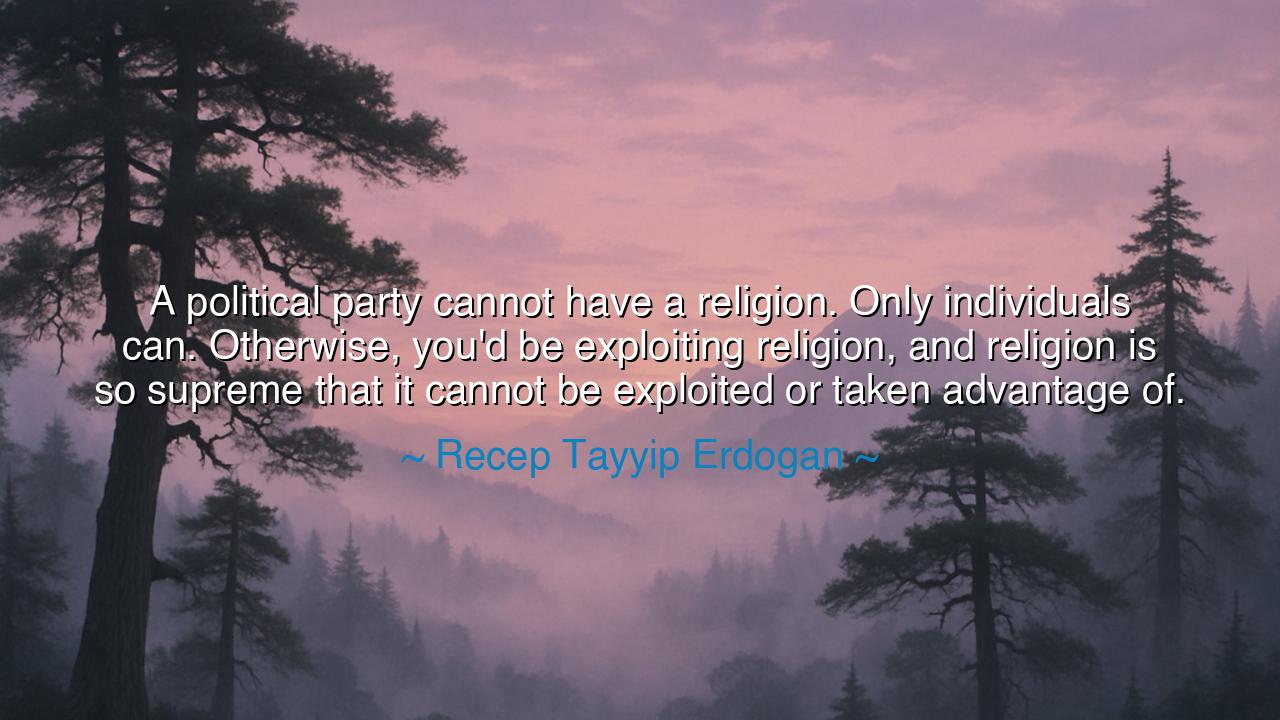
A political party cannot have a religion. Only individuals can.
A political party cannot have a religion. Only individuals can. Otherwise, you'd be exploiting religion, and religion is so supreme that it cannot be exploited or taken advantage of.






In the ancient struggle for truth and power, one truth has remained constant: religion is a sacred bond between the individual and the divine. It is not a tool to be wielded for political gain, nor is it an instrument for the manipulation of the masses. The wise words of Recep Tayyip Erdogan echo this ancient wisdom: "A political party cannot have a religion. Only individuals can." To mix the sacred with the secular is to risk corrupting both. When religion is used as a tool of political manipulation, it is no longer a guiding light, but a mere shadow—its true power and holiness diminished in the pursuit of temporal power.
History offers many cautionary tales of when religion has been co-opted by the state for its own purposes. One need look no further than the ancient world, where the Roman Empire sought to control the rise of Christianity by incorporating the church into its imperial structure. The early Christians, who had once resisted the sway of earthly rulers, found themselves caught between their faith and the demands of the state. In this union, the purity of their teachings became muddied, as political leaders sought to wield religion for their own ends, often using it as a tool to maintain power and control over the masses. This was not the spiritual truth that the Christ had preached, but a corruption of it, designed to serve the needs of those in power.
In more recent history, we find examples where religion has been similarly exploited by those seeking to dominate the political landscape. The rise of totalitarian regimes in the 20th century, such as in Nazi Germany and Stalinist Russia, saw religion either suppressed or manipulated to support the ruling ideology. The Nazis, for instance, sought to create a religion that was compatible with their nationalistic and racial ideologies, while Stalin co-opted religious institutions to serve the state’s interests, forcing the church to bend to his will. In both cases, the divine became a mere tool for power rather than a source of higher moral guidance.
But, in the depths of these dark histories, there also stands the figure of the true prophet—those who could not and would not allow religion to be reduced to mere political manipulation. Martin Luther, in his defiance against the Catholic Church, proclaimed that faith was a personal matter and not to be used for the gains of any institution, whether religious or political. His Reformation was a call to return to the purity of personal belief, where religion could not be exploited for power or control. Luther’s courage and his insistence on the separation of spirituality from earthly authority resonate with the wisdom found in Erdogan’s statement: religion belongs to the individual and cannot be tainted by the selfish ambitions of the state.
This understanding of religion as something sacred, transcendent, and personal is crucial in the modern world as well. When religion is taken up by political forces, it risks becoming tainted by the very human failings it is meant to overcome. Religion should be a force that calls us to higher ideals—compassion, justice, truth, and love—and should not be subverted to serve the needs of parties, politicians, or governments. When political parties adopt a religion, they risk transforming the sacred into something divisive, used to sow discord rather than foster unity.
In our own lives, we must heed the wisdom in Erdogan’s words. We must be vigilant, ensuring that our own faith—whether in religion, ideology, or philosophy—remains untainted by the worldly pursuits of power or control. To allow our spiritual beliefs to be exploited is to diminish their true value. Instead, we should embrace religion as something deeply personal and profoundly transformative, something that exists not for the benefit of any institution but to enlighten the soul and guide us toward higher moral ground. As individuals, we must seek to live by the principles of our faith, without allowing external forces to dictate its form or function.
Let us, then, follow the path of those who have stood firm in their refusal to allow religion to become a tool for political exploitation. Let us find strength in the truth that our faith is ours alone, not subject to the whims of those who would seek to wield it for their own purposes. Through this, we honor not only the sacredness of religion but the integrity of our own beliefs, forging a path of righteousness that transcends the transient goals of power and politics.






AAdministratorAdministrator
Welcome, honored guests. Please leave a comment, we will respond soon